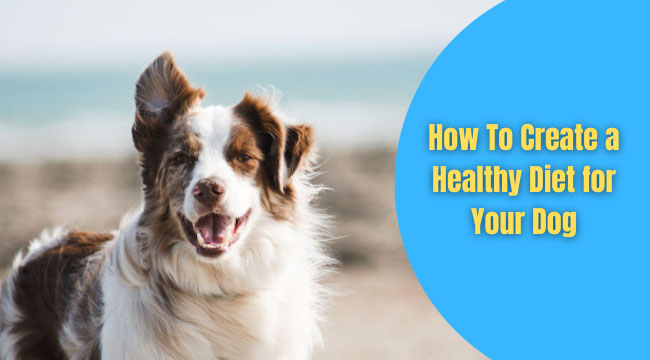
Have you noticed that your dog is getting thinner? Or are they big but tend to get tired easily? If your dog is going through one of these scenarios, then you may want to create a better diet for your dog.

Most dog moms and dads around the world worry about whether they’re feeding suitable meals for their pups and providing them with the best possible nutrients and vitamins. Indeed, there are several diets for pups on the Internet. While some can be helpful, it’s hard to determine which diet, food, and items are the best for your four-legged friend.
Read More:
- Dog Feeding Time: How Much and How Often?
- Incredible Methods To Manage Your Dogs Weight
- Feeder Insects: Nutrition Values
- 5 Common Dog Health Problems and How to Treat Them
- Can Crested Geckos Eat Fruit?
Hence, today we’ll talk about how you can craft a healthy diet for your dog. This page covers healthy foods your dog will surely enjoy and the diet you can create with these ingredients. Read on below to learn more about it!
List of Foods for Your Dog
When creating a healthy diet perfect for your dog, you’d need to know what food you must include in their diet. This list can help you make a hearty meal for your pups!
Dog Treats
We can’t miss out on dog treats for this list! It’s an absolute must for dogs since it helps add extra nutrients and healthy minerals to your pet’s diet. In addition, you can use it for training or reward good behavior. It’s also a great way to relieve boredom and reduce your pet’s destructive behavior.
Given its importance, dog owners must purchase long lasting dog treats that won’t go bad. When creating a day’s meal for your dog, you would have to consider their weight and how much food they ate during the day. It makes every dog owner’s life easier when their purchased dog treats have a long shelf life, even if it has been opened.
Crushed Eggshells
You may get shocked why eggshells are on this list. However, contrary to belief, eggshells are a good source of protein and calcium for dogs! In addition, it supports and encourages your pup’s healthy teeth and strong bones!
If you want a natural source of calcium, rather than purchasing a supplement for your dogs, opt for eggshells for a better source of calcium. Research also suggests that it helps improve joint, heart, and muscle health. Not only that, but crushed eggshells can also support your dog’s immune system!
When including eggshells in their meal, you can either feed the shells to them directly or crush the shells in a blender. You won’t have to risk your dogs getting choked by the egg shells, and you can still take advantage of all the calcium from the shells! Directly feeding it to them may get it stuck on their teeth or jaw, so be sure to check their mouth after eating and drinking water.
Liver
Liver is an excellent source of numerous vitamins like A and B (B2, B9, and B12). Eating liver can also provide your dog minerals such as copper, choline, and iron. All these minerals and vitamins are essential for pups to maintain a healthy vision and overall growth, especially Vitamin A.
The liver is rich in numerous nutrients. However, when feeding your pup, ensure that you gradually expose it to the food. Avoid feeding it to them every day. Instead, you can start with 1/2 tbsp of crushed liver for a medium-sized dog a few times a week.
Planning a Healthy Diet
When crafting a diet, remember that your pups are also unique individuals. What worked for a friend’s diet may not work for your pup. When creating a daily diet for your dog, consult with your vet to determine what foods are good for your dog.
For example, if you plan on adding meat to your dog’s diet, ensure it’s safe for human consumption. It’s because sometimes, meat marketed for dogs may contain preservatives that are bad for your dog’s health.
If you want to stay on the safe side, you can hire a veterinary nutritionist to formulate a well-crafted diet for your dog. This way, you can ensure that, with the help of a professional, the food your dog is eating is safe. It’s because while some pups can handle raw food, some can’t and may risk your pup getting bacterial infections.
Additionally, your dog’s food portion size will largely depend on their breed, age, and size. Another factor that contributes to this is how regularly the dog exercises. The key to feeding pups is to find the golden line where you don’t overfeed and underfeed your pup. If you’re unsure, you can ask your veterinarian to assess their nutrition and diet.
Final Thoughts
Many fur moms and dads worldwide are just like you – worried if the food they give their pups is just the right amount. As first-time dog owners, it’s easy to be clumsy at first. However, it’s a must to take a step further to ensure that your pup gets the best diet possible. The only way to do this is by reading more articles to help you craft a perfect diet for your dog.



